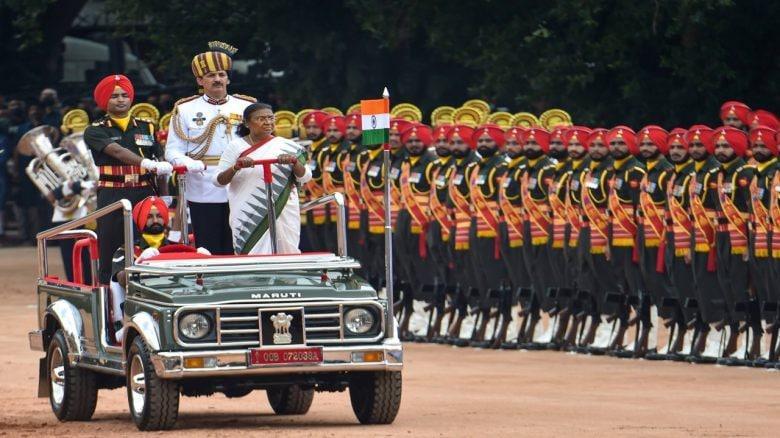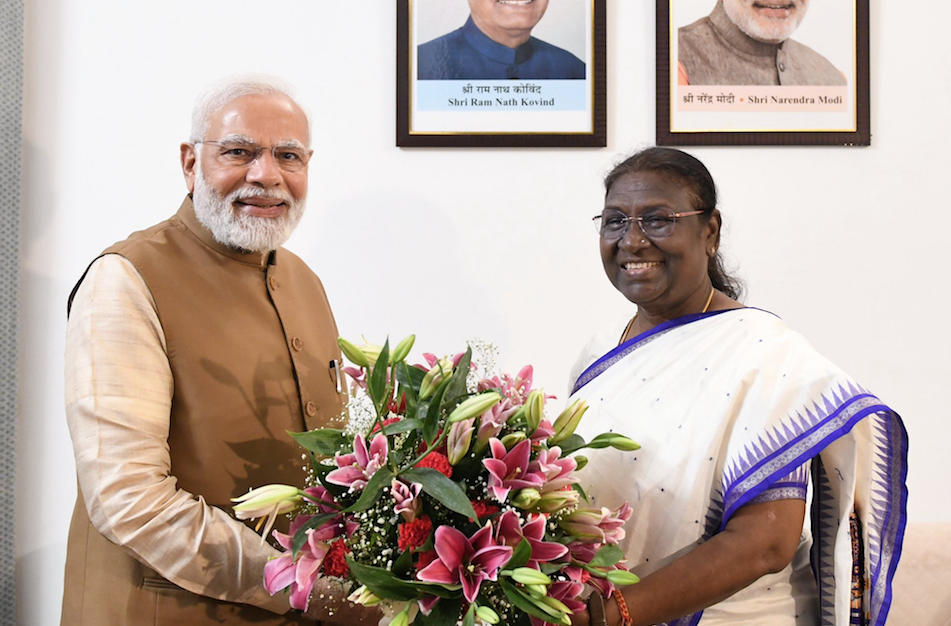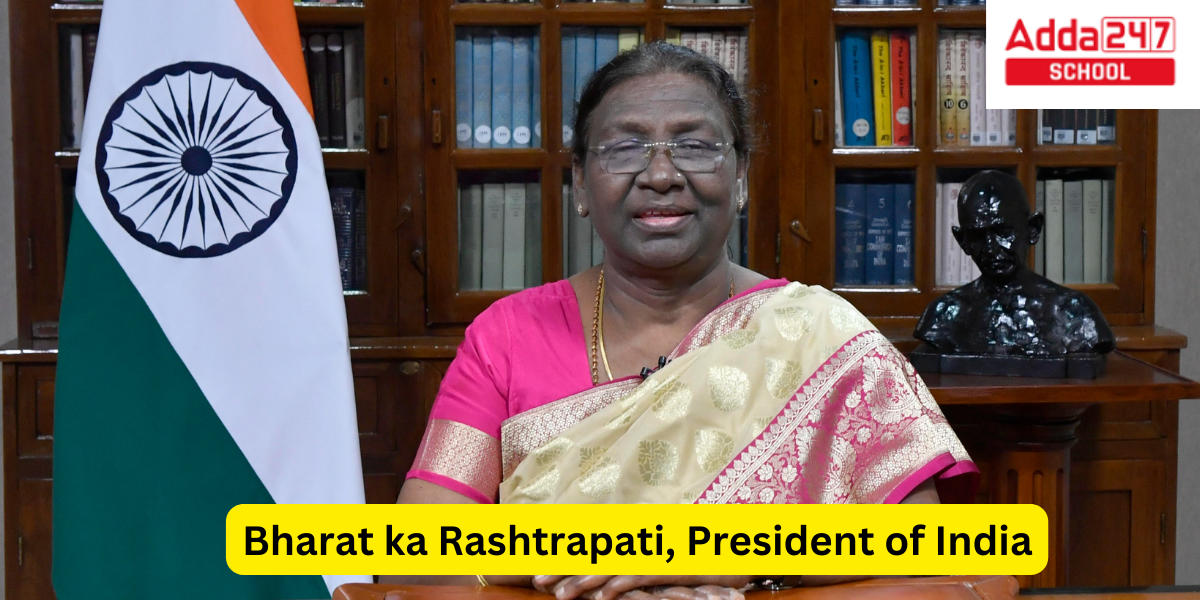President of India
The head of state of the Republic of India is the president. The president serves as the titular leader of the executive branch, the nation’s first citizen, and the supreme commander of the Indian Armed Forces. The 15th and current president is Droupadi Murmu, who took office on July 25, 2022.
- The position of president was established on January 26, 1950, when India became a republic after obtaining independence on August 15, 1947, when its constitution took effect.
- The legislative assemblies of each of India’s states and territories, as well as both chambers of the Indian Parliament, which were all chosen directly by the people, are used to elect the president in an indirect manner.
- With a few exceptions, Article 53 of the Indian Constitution states that the president may exercise their powers directly or through a subordinate authority.
- In practise, however, the prime minister—a subordinate authority—exercises all of the president’s executive powers while receiving advice from the Cabinet Ministers.
- The president must follow the advise of the prime minister and cabinet as long as it does not conflict with the constitution, according to the constitution.
President of India- Powers
The president’s principal duty is to uphold, defend, and uphold the Indian Constitution and Law, as stated in their oath of office (Article 60 of Indian constitution). The head of all autonomous constitutional entities is the president. All of their initiatives, recommendations (Articles 3, 111, 274, etc.), and oversight (Articles 74(2), 78C, 108, 111, etc.) over the Indian administrative and legislative branches must be employed in conformity with the constitution. The president’s acts can be contested in court without any restrictions.
Legislative Powers of the President of India
According to the constitution, the Parliament of India, whose president serves as its head, has been given the authority to enact laws (Article 78, Article 86, etc.). The president prorogues the Lok Sabha and Rajya Sabha, the two houses of the parliament. The Lok Sabha may be dissolved by them.
In accordance with Article 87, the president addresses the legislature after the general elections and also at the start of the first session each year (1). On these occasions, the president’s speech is typically intended to lay forth the new government policy.
Executive powers of the President of India
The opinions of the President of the Indian Union are normally governed by those of his Ministers, and neither he nor they are subject to being overruled. Any Secretary may be fired at any time by the US President. While his Ministers have a majority in Parliament, the President of the Indian Union lacks the authority to act in that manner.
Judicial powers of the President of India
According to Article 60, the president’s main responsibility is to uphold, defend, and preserve the Indian constitution and the law. On the chief justice’s recommendation, the president selects the Chief Justice of India and other judges. A judge may be fired by the President with the support of two-thirds of the two Houses of the parliament.
According to Article 76(1) of the Indian Constitution, the president of India appoints the Attorney General of India, who serves at the president’s leisure as the government of India’s top legal advisor. The president may also request the advisory opinion of the supreme court under Article 143 if they believe a legal issue or a matter of public interest has emerged. According to Article 88, the president may request that the attorney general attend the parliamentary proceedings and, if any, notify him of any illegal activity.
Military powers of the President of India
The Indian Armed Forces’ Supreme Commander is the president. On the advice of the Union Council of Ministers, which is led by the prime minister, only the president has the authority to declare war or sign a peace treaty. All significant agreements are made in the name of the president.

President of India Eligibility
The main requirements for being eligible for the post of president are laid out in Article 58 of the constitution. To be president, one must:
- be 35 years old
- be a citizen if India
- be eligible to a member of Lok Sabha
If a person holds a position of profit under the jurisdiction of the Government of India, the Government of any State, or any local or other authority, they are not eligible to be elected president.
Current President of India: Droupadi Murmu
Since July 25, 2022, Droupadi Murmu, an Indian politician, has presided as India’s 15th president. She is the second woman to hold the position after Pratibha Patil and the first member of a tribal community to do so. She is the first President born in Independent India and the youngest person to hold the position.

She worked as a teacher in Rairangpur till 1997 after serving as a clerk in the State Irrigation and Power Department from 1979 to 1983.
Anti Defection Law in India, Amendment and Schedule
Current President of India: Droupadi Murmu Personal Information
- On June 20, 1958, Droupadi Murmu was born to a Santali family in the village of Uparbeda in the Rairangpur, Odisha, neighbourhood of Baidaposi.
- Biranchi Narayan Tudu, her father, was a farmer.
- Her father and grandfather served as the local council’s traditional leaders, or Sarpanch (Gram Panchayat).
- They gave her the name Puti Tudu.
- Her teacher changed her name from Durpadi to Droupadi, and she had previously gone by the names Dorpdi and Durpadi.
- At the neighbourhood elementary school in Uparbeda, Murmu studied elementary education. She came to Bhubaneswar at the age of five to pursue higher education.
- She earned her secondary education at Girl’s High School Unit 2 and her bachelor’s degree in arts at Rama Devi Women’s College.
In 1980, she wed financier Shyam Charan Murmu, with whom she had two sons and a daughter. Between 2009 and 2015, she lost her husband, two sons, mother, and one brother. She subscribes to the Brahma Kumaris school of thought.
Who is the First President of India?
Current President of India: Droupadi Murmu political Champians
The National Democratic Alliance (NDA) chose Murmu as its candidate for president of India in June 2022, one month before elections. The opposition parties chose Yashwant Sinha as their presidential candidate. Murmu travelled to many states during her election campaign to solicit support for her candidature.
Before the election, a number of opposition parties, including the BJD, YSRCP, JMM, BSP, SS, and JD(S), declared their support for her candidature. With 676,803 electoral votes (64.03% of the total) in 21 of the 28 states (including the union territory of Puducherry), Murmu easily defeated Yashwant Sinha in the 2022 Presidential election to become the 15th President of India on July 21.
The Vice President of India: List, Eligibility, Election, Term
List of Presidents of India from Freedom
Following is the list President of India from 1950 to Current President of India, Droupadi Murmu:
|
Name |
Joining Date |
End Date |
| Dr. Rajendra Prasad | 26 January 1950 | 13 May 1962 |
| Dr. Sarvepalli Radhakrishnan | 13 May 1962 | 13 May 1967 |
| Dr. Zakir Hussain | 13 May 1967 | 3 May 1969 |
| Varahagiri Venkata Giri | 3 May 1969 | 20 July 1969 |
| Varahagiri Venkata Giri | 24 August 1969 | 24 August 1974 |
| Fakhruddin Ali Ahmed | 24 August 1974 | 11 February 1977 |
| Neelam Sanjiva Reddy | 25 July 1977 | 25 July 1982 |
| Giani Zali Singh | 25 July 1982 | 25 July 1987 |
| Ramaswamy Venkataraman | 25 July 1987 | 25 July 1992 |
| Shankar Dayal Sharma | 25 July 1992 | 25 July 1997 |
| Kocheril Raman Narayanan | 25 July 1997 | 25 July 2002 |
| Dr. A.P.J. Abdul Kalam | 25 July 2002 | 25 July 2007 |
| Pratibha Patil | 25 July 2007 | 25 July 2012 |
| Pranab Mukherjee | 25 July 2012 | 25 July 2017 |
| Shri Ram Nath Kovind | 25 July 2017 | 21 July 2022 |
| Droupadi Murmu | 21 July 2022 | In office |
President of India List From 1947 to 2022 [Updated]
Salary and Perks- President of India
Here, the president of India’s pay is addressed. The Indian government raised the president’s pay to 1.5 lakh rupees on September 11, 2008. (approximately to 3.9 lakh in 2022). This compensation was raised to 5 lakh in India’s 2018 Union budget (equivalent to 5.9 lakh in 2022). The head of state of the Republic of India is the President. Both the actual head of state and the supreme commander of the Indian Armed Forces are the president.









 Try CUET College Predictor 2025 to Predi...
Try CUET College Predictor 2025 to Predi...
 CUET Result 2025 OUT (Today) @cuet.nta.n...
CUET Result 2025 OUT (Today) @cuet.nta.n...
 Why the Delay in CUET UG 2025 Results? C...
Why the Delay in CUET UG 2025 Results? C...









